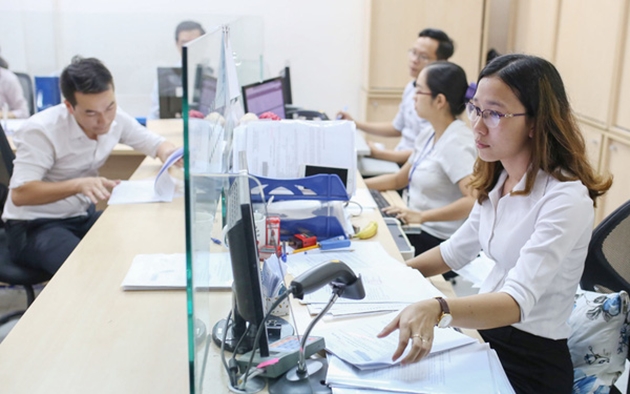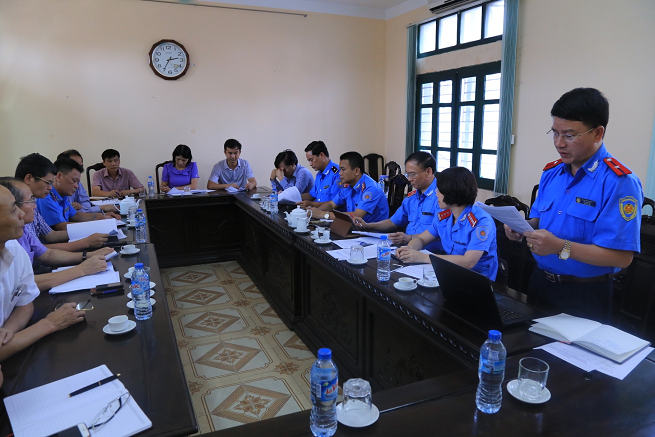On May 21, 2018, the Central Executive Committee of Vietnam issued Resolution 27-NQ/TW 2018. It stipulates the reform of wage policies for officials and public employees. However, due to the widespread impact of the Covid-19 pandemic, this policy will be temporarily postponed.

Postpone the schedule for wage reform for officials and public employees in Vietnam (Illustrative photo)
According to Resolution 27-NQ/TW, the Central Executive Committee of Vietnam has determined:
The wage policy is a particularly important part of the socio-economic policy system, directly related to the major balances of the economy, the labor market, and the life of wage earners, contributing to building a streamlined, clean political system that operates effectively, efficiently, and fights corruption and waste.
To implement this policy, the competent authority needs to focus on the following specific objectives:
- From 2021, apply new unified wage policies for officials and public employees, and the armed forces throughout the entire political system.
- In 2021, the lowest salary for officials and public employees will be equal to the average lowest salary of the regions in the enterprise sector.
- Periodically adjust salaries in line with the consumer price index, economic growth rate, and the state budget's capability.
- By 2025, the lowest salary for officials and public employees will be higher than the average lowest salary of the regions in the enterprise sector.
- By 2030, the lowest salary for officials and public employees will be equal to or higher than the lowest salary of the highest region in the enterprise sector.
There are 07 important contents in the wage reform policy for officials and public employees, including:
1. Abolish the statutory pay rate and the current salary coefficient in Vietnam
At Point c, Clause 3.1, Section 3, Part II of Resolution 27-NQ/TW, it is stipulated to abolish the statutory pay rate and the current salary coefficient, creating a basic salary amount in the new salary table.
2. Pay salary for officials and public employees according to the job position in Vietnam
In the public sector, the State pays salaries to officials and public employees and the armed forces based on job position, title, and leadership position, in line with the State's resources and public service revenue, ensuring a reasonable correlation with wages in the labor market; implementing policies of appropriate treatment and rewards based on labor productivity, creating motivation to improve job quality, work ethics, professional ethics, contributing to a clean and efficient political system.
3. Implement a new salary table system in Vietnam
Develop and issue a new salary table system based on job position, title, and leadership position replacing the current salary table system; convert old salaries to new ones, ensuring they are not lower than the current salaries received:
- Develop 1 salary table for leadership positions applicable to officials and public employees holding leadership roles (elected and appointed) in the political system from the Central to the communal level;
- Develop 1 professional salary table according to the official grade and the professional title of public employees applicable to officials and public employees not holding leadership positions; each official grade and public employee professional title has multiple salary levels;
- Develop 3 salary tables for the armed forces.
4. A new salary structure for officials and public employees from 2021
Design a new salary structure including: Basic salary (accounting for about 70% of the total salary fund) and allowances (accounting for about 30% of the total salary fund). Add bonuses (the bonus fund is about 10% of the total salary fund for the year, excluding allowances).
5. Abolish seniority allowances for officials and public employees
Abolish seniority allowances (except for the army, police, and encryption to ensure salary correlation with officials); leadership allowances (since leadership titles in the political system implement leadership salary ranks); allowances for party, union, and socio-political work; public service allowances (since already included in the basic salary); and hazardous, dangerous allowances (since already included in allowances by profession due to hazardous labor conditions).
6. Abolish a series of extra budgetary allowances
Abolish extra-budgetary allowances for officials and public employees originating from the state budget such as: Meeting allowances; allowances for the formulation of legal normative documents, projects; seminars... Implement payroll budget allocation linked to staffing reduction goals for agencies and units. Expand the mechanism of cost allocation linked to task performance results. Do not link officials and public employees' salaries with the development, amendment, and supplementation of policy regulations and non-salary policies. Research provisions for extra-salary policies (cars, phones...). Only issue new policies when resources are arranged and balanced for implementation.
7. Officials and public employees in many provinces will receive additional income
Expand the implementation of pilot mechanisms for some centrally governed cities and provinces that have balanced their budgets and ensured sufficient resources for wage reform and social security policies to pay average additional income not exceeding 0.8 times the basic salary fund for officials and public employees under their management.
According to the plan, the wage reform policy for officials and public employees will be implemented on January 1, 2021. However, due to the overall impact of the Covid-19 pandemic, this policy will be postponed.
To be specific:, according to an announcement from the Office of the Central Committee of the Communist Party, the 13th Conference of the 12th Central Executive Committee of the Communist Party from October 5 - 9 discussed and gave opinions on many important issues. Among them, the Central Executive Committee of the Communist Party agreed with the proposal of the Party caucus of the Government of Vietnam that the implementation date of the new wage policies will be from July 1, 2022 (instead of 2021 as previously) for officials and public employees, the armed forces, and laborers in enterprises according to Resolution 27-NQ/TW.
Thus, the salary policy for officials and public employees in the coming period will remain as it is currently. During this time, the Government of Vietnam will host, cooperate with relevant agencies to continue researching and completing new wage policies, ensuring they comply with the economic situation, budget capability, and in accordance with the principles and directions of Resolution 27.
Thuy Tram
 Article table of contents
Article table of contents
![[InfoGraphic] 6 forms of discipline for officials and public employees under Decree 71/2016/ND-CP](https://cdn.lawnet.vn//uploads/NewsThumbnail/2016/07/12/1319291-01.png)




.Medium.png)
.Medium.png)
.Medium.png)
.Medium.png)
